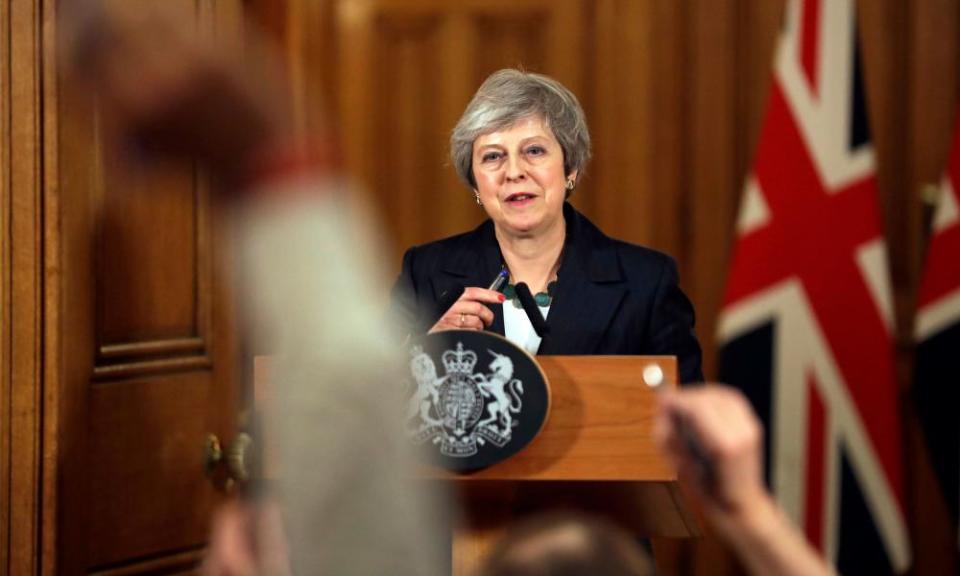The Guardian view on a Tory Brexit: irreconcilable differences

Few prime ministers have taken the pummelling that Theresa May has endured, especially since she published her blueprint for Britain’s relationship with the EU in July. The Chequers plan, as it was known, was pronounced dead by the EU two months later in Salzburg. Mrs May was then sent back to rework her proposals, a humiliation in the eyes of her party that she has not lived down. Since then, the prime minister has been viewed with condescension, even contempt, by her own MPs. It has often appeared that Mrs May leads a party that has taken leave of its senses. This week, Mrs May produced a plan, acceptable to continental capitals, for the two-year transition period when Britain leaves the EU. This has finally tipped large sections of the Tory party over the edge.
Two cabinet ministers have resigned as well as a raft of junior ones. MPs from the hardline European Research Group are busy tweeting pictures of letters demanding that Mrs May goes. Her difficulty is that few people seem to be impressed by her or her Brexit plan: not the left of her party (who consider her proposals to be an inferior position to the status quo) nor its right (who reject it for falling short of their fantasy). Over three hours at the dispatch box this morning, it became obvious that the deal Mrs May struck with the EU is dead. Her platform would be one that any challenger would run against. Mrs May finds no support from the opposition benches or from the Democratic Unionist party.
The end is nigh for this phase of British politics. Mrs May might survive a leadership challenge to limp on. Her plan certainly will not. In facing down rebels, the Fixed-term Parliaments Act constrains Mrs May. She can no longer turn votes into issues of confidence that, if lost, would trigger an election. She cannot just go on losing votes. MPs will eventually have to be allowed to vote on alternatives, which might include whether to have a softer – or a harder – Brexit deal than Mrs May has secured; whether a general election ought to be held; and even whether or not to endorse a second referendum. To stave off such thoughts, Mrs May says the only other option is for Britain to “leave with no deal”. If politicians ought to have learned anything since 2016 it surely must be that the country is not in a mood to be scared into submission.
This points to a feature not a bug in Brexit: untamed nationalism is a powerfully destructive force. A decade ago, the largely sublimated Euroscepticism of the Conservative party began to break through. The veteran Europhile grandee Ken Clarke began featuring as the most rebellious Tory MP. This has led to fantasy. Brexiters, wrongly, have argued that leaving Europe is a way to restore Britain’s greatness. The nationalist vote against the EU, say leavers, was not to shrink the UK. Rather, they claim, Brexit Britain ought to play a role in the world independent of Europe, not lost within it. As Mrs May put it, Britain voted “to leave the European Union and embrace the world ... to build a truly global Britain”. This is poppycock. The EU is a force multiplier for this country. In leaving, Britain will almost certainly be a diminished and angrier place.
With just four months to Brexit this is not the time for a protracted Conservative leadership contest. What prevents a speedy contest is that there is no consensus over a post-May Brexit strategy. A divided party cannot guide this nation out of the EU. It is delusional to think leaving Europe will immediately boost the economy. The Tories risk repelling voters living in Britain’s most dynamic regions. The Tories had largely contained their European passions in informal factions. The problem is that Euroscepticism is an ideology rooted in abstract ideas, not in experience. Being in Europe encouraged trust, reciprocity and good behaviour. Falling out risks the opposite. The Conservative party has stayed intact for almost the whole of the past century, imbibing the crucial lesson of Labour’s traumatic experience in the 1980s – that any splinter party would disappear in the remorseless logic of the electoral system. Parties do experience rifts. But Brexit is turning these into an existential fight for the soul of the Tory party, with Britain as collateral damage.

 Yahoo News
Yahoo News 